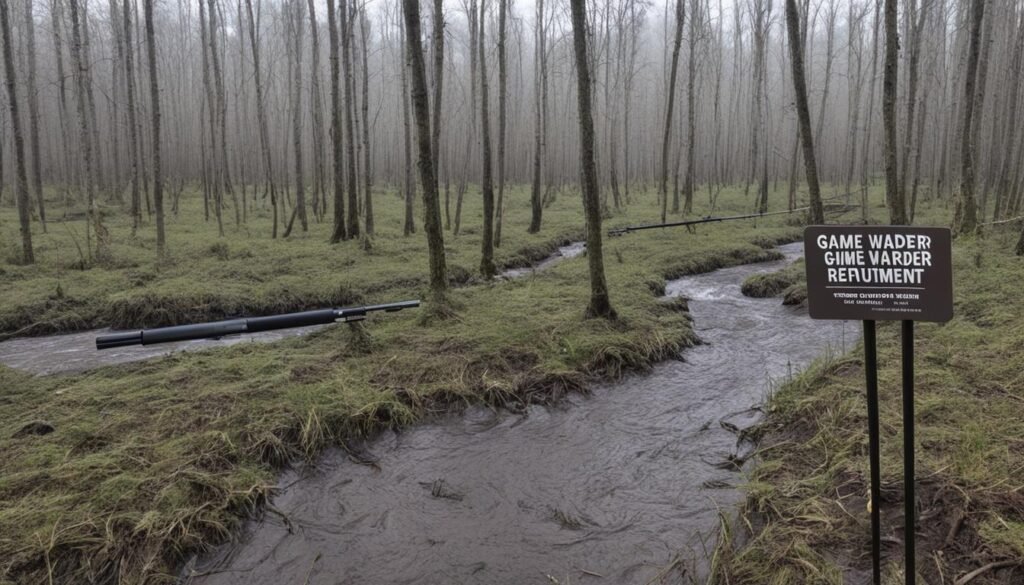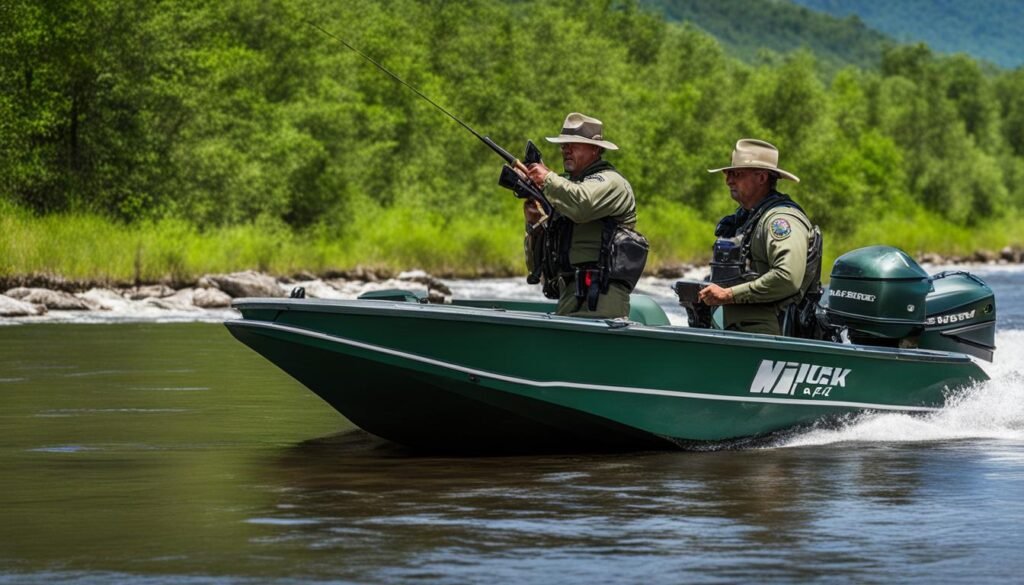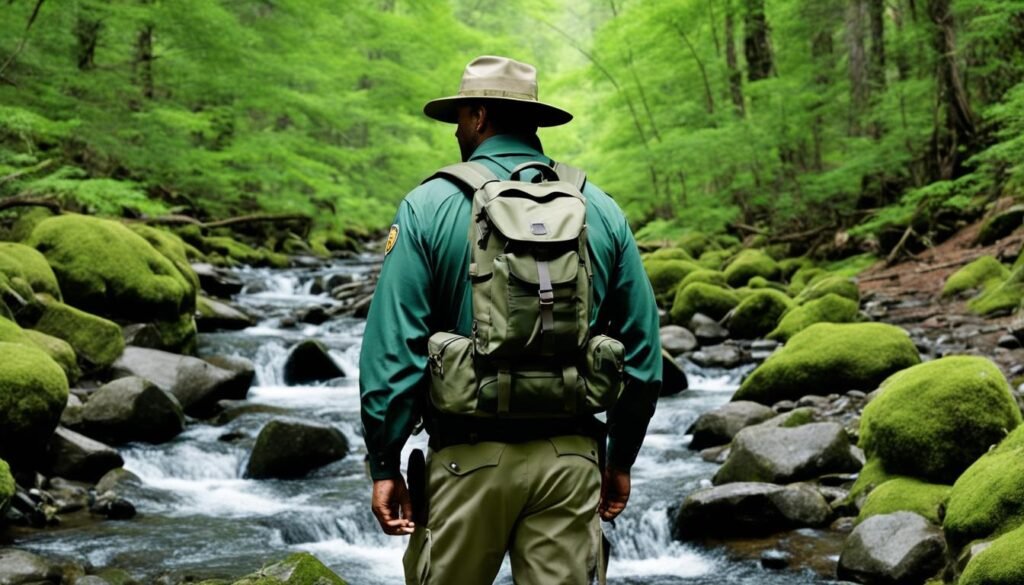Hi, I’m here to share my journey of becoming a Fish and Game Warden. If you have a passion for wildlife conservation, law enforcement, and protecting our natural resources, then this might be the career for you.
As a Fish and Game Warden, also known as a Fishing and Wildlife Officer or Wildlife Warden, you will play a crucial role in preserving and managing our state’s game and fish populations, enforcing hunting and fishing regulations, and ensuring environmental protection.
Key Takeaways:
- Becoming a Fish and Game Warden requires dedication, education, and physical fitness.
- You will need a relevant bachelor’s degree in fields such as Biology, Environmental Science, or Criminal Justice.
- Internships in resource management, outdoor recreation, or law enforcement can provide valuable experience.
- Each state and federal agency has its own requirements and training protocols.
- Game wardens have a wide range of responsibilities, including patrolling, investigations, and conducting biological duties.
Education and Experience Requirements
To become a fish and game warden, there are specific education and experience requirements that need to be met. Most states require a bachelor’s degree in fields such as Wildlife Management or Criminal Justice. This educational background provides the foundational knowledge and skills necessary for the role. However, in some cases, relevant experience may be accepted in lieu of a degree.
For those interested in pursuing a career as a federal game warden, it is common to gain several years of experience as a state game warden before joining the U.S. Fish and Wildlife Service. This experience provides valuable on-the-job training and a deeper understanding of the responsibilities of the role.
Each state and federal agency may have its own specific requirements and training protocols. It is important for aspiring game wardens to research and familiarize themselves with these requirements to ensure they are prepared for the application process.
When considering a career as a fish and game warden, individuals should be prepared to invest time and effort into their education and gaining relevant experience. By meeting the necessary requirements and completing the required training, aspiring game wardens can position themselves for success in this rewarding field.
Minimum Requirements for Employment
To be eligible for employment as a game warden, candidates must meet certain minimum requirements. These requirements include:
- Being at least 21 years old (18 in some states)
- Having a valid driver’s license
- Being a U.S. citizen
- Possessing good physical fitness
- Holding good mental fitness
- No felony convictions or misdemeanor convictions related to domestic violence
Game wardens play a crucial role in law enforcement and conservation, so it’s important that candidates meet these minimum requirements to ensure they are capable of performing the duties of the job. Physical fitness is particularly important as game wardens often work in rugged outdoor environments and may need to engage in physically demanding activities. The mental fitness requirement ensures that candidates have the capacity to handle the challenges and responsibilities of the role.
Additionally, having a clean criminal background is vital as game wardens must uphold the law and maintain the trust of the communities they serve. Any felony convictions or misdemeanor convictions related to domestic violence can disqualify candidates from consideration.
Once these minimum requirements are met, candidates can continue their journey towards becoming a game warden by pursuing further education, training, and experience.

Training and Certification
After meeting the minimum requirements, aspiring game wardens must undergo training and certification to prepare them for their roles in wildlife law enforcement. Both federal and state game wardens receive comprehensive training to develop the necessary skills and knowledge for their demanding responsibilities.
Federal Game Warden Training
Federal game warden trainees typically complete 20 weeks of basic training at a federal law enforcement agency. This training covers a wide range of topics, including federal statutes and regulations, firearms proficiency, arrest techniques, and investigative procedures. Trainees also receive specialized training in wildlife law enforcement, learning how to handle specific situations and enforce wildlife protection laws.
Following basic training, federal game warden trainees proceed to 44 weeks of field training, where they gain hands-on experience working alongside experienced game wardens. This field training allows trainees to apply their knowledge in real-world scenarios, further developing their expertise in wildlife law enforcement and conservation.
State Game Warden Training
The training requirements for state game wardens can vary depending on the state. However, state game warden training programs generally provide comprehensive instruction in wildlife law enforcement, conservation, and natural resource management.
State-specific training programs can vary in duration, typically ranging from several weeks to several months. These programs cover a wide range of topics, including state hunting and fishing regulations, wildlife identification, search and rescue techniques, and outdoor survival skills. State game warden trainees also undergo physical fitness assessments, medical evaluations, and psychological evaluations to ensure they are prepared for the physical and mental demands of the job.
Throughout their training, both federal and state game warden trainees are required to demonstrate proficiency in various areas, including firearms handling, emergency response, and communication skills. Successful completion of the training program is essential for certification as a game warden and the start of a fulfilling career in wildlife law enforcement.
Job Responsibilities
As a game warden, I have a diverse range of duties and responsibilities that revolve around the protection and conservation of fish and wildlife. My primary role is to patrol designated areas and enforce laws and regulations related to fish and wildlife. This involves actively monitoring for and investigating potential fish and wildlife violations, such as illegal hunting, fishing, and trapping activities.
In addition to enforcing the law, I am also responsible for conducting thorough investigations into suspected violations. This may include gathering evidence, interviewing witnesses, and collaborating with other law enforcement agencies to build strong cases for prosecution. My work contributes to ensuring the integrity and sustainability of our natural resources.
Part of my biological duties as a game warden is conducting population surveys to assess the health and abundance of various species. These surveys provide valuable data that inform wildlife management decisions and conservation efforts. I may also participate in aerial surveys to monitor wildlife populations, especially for large and elusive species.
State game wardens typically serve in specific counties and handle all fish and wildlife issues within their jurisdiction, while federal game wardens may have responsibility for an entire region. Regardless of the level of jurisdiction, the job of a game warden requires physical fitness, mental agility, and adaptability. I must be prepared to face challenging and sometimes dangerous situations, all while upholding the laws that protect our valuable natural resources.

Career Advancement
As a game warden, there are ample opportunities for career advancement and promotions. In the federal service, game wardens can work their way up from the position of Special Agent to more senior roles such as Resident Agent in Charge, Assistant Special Agent in Charge, Special Agent in Charge, and even Chief of Law Enforcement.
Advancements in rank and responsibility are often accompanied by additional training and experience. Game wardens may need to complete specialized training programs to qualify for higher positions. These programs can provide them with the skills and knowledge necessary to take on leadership roles and effectively supervise other officers.
Promotions within federal agencies may also involve assignments at the regional or national level, giving game wardens the opportunity to work on larger-scale operations and collaborate with different agencies to protect fish, wildlife, and natural resources.
Career advancement opportunities may also exist within state-level agencies, although specific paths and titles can vary depending on the state. State game wardens can pursue promotions within their agency hierarchy, taking on roles with increased responsibility and leadership.
It is important for game wardens aspiring for career advancement to actively seek out professional development opportunities, such as additional trainings, certifications, and continuing education courses. These endeavors can help game wardens stay up-to-date with the latest law enforcement techniques, advancements in wildlife management, and emerging conservation practices.
Salary and Benefits
As a game warden, the salary you can expect to earn will depend on the state or federal agency you work for, as well as your location. State game wardens typically earn an average salary ranging from $30,000 to $52,000 per year. On the other hand, federal game wardens usually start at a salary of approximately $40,000 per year, with the opportunity for additional Law Enforcement Availability Pay.
Along with a competitive salary, game wardens often enjoy a variety of benefits. These can include retirement plans, health insurance, and paid time off. The specifics of the benefits package may vary depending on the agency you work for, but they are typically designed to provide you with financial stability and security.
The Benefits of Being a Game Warden
- Retirement plans: Prepare for your future with a generous retirement plan that offers financial security.
- Health insurance: Take care of your health with comprehensive medical coverage that includes options for dental and vision care.
- Paid time off: Enjoy a healthy work-life balance with paid vacation days and holidays throughout the year.
- Opportunities for career advancement: Game wardens have the opportunity to advance their careers and take on leadership roles within their agencies.
- Law Enforcement Availability Pay: Federal game wardens may be eligible for additional pay to compensate for the irregular hours and on-call duties that come with the job.
With promotions and years of service, your salary and benefits may also increase, allowing you to enjoy a rewarding and fulfilling career in game and wildlife law enforcement.
Conclusion
Becoming a fish and game warden requires dedication, education, and physical fitness. It is a rewarding career that allows individuals to protect wildlife and natural resources. By meeting the necessary requirements, undergoing training, and gaining experience, aspiring game wardens can embark on a fulfilling career in law enforcement and conservation.
As a fish and game warden, you will have the opportunity to make a real difference in preserving our precious wildlife and ensuring the sustainability of our natural resources. Your role will involve enforcing laws related to hunting, fishing, and wildlife conservation, as well as conducting investigations and educating the public on the importance of preserving our environment.
Through your education and training, you will develop the skills and knowledge necessary to handle various situations, from enforcing hunting regulations to handling wildlife emergencies. Your physical fitness will be crucial, as you will often be required to work in rugged terrain, endure long hours, and even engage in physical confrontations when necessary.
If you have a passion for nature, a strong sense of responsibility, and a desire to protect our wildlife and natural habitats, a career as a fish and game warden may be the perfect fit for you. Take the first step towards this fulfilling career by exploring the education and experience requirements, and start your journey towards becoming a guardian of our natural resources.
FAQ
What are the education and experience requirements to become a fish and game warden?
To become a fish and game warden, it is generally necessary to obtain a relevant bachelor’s degree in fields such as Biology, Environmental Science, or Criminal Justice. Internships and knowledge about the outdoors and outdoor activities are also important. Becoming a state law enforcement agent is another crucial step in the journey to becoming a fish and game warden.
What are the minimum requirements for employment as a game warden?
To be eligible for employment as a game warden, candidates must typically be at least 21 years old (or 18 in some states), hold a valid driver’s license, and be a U.S. citizen. Good physical and mental fitness, as well as a clean criminal background, are also essential.
What is the training and certification process for game wardens?
Game wardens must undergo training and certification. Federal game warden trainees usually complete 20 weeks of basic training at a federal law enforcement agency, followed by 44 weeks of field training. State game wardens also receive extensive training that varies from state to state and includes physical fitness assessments, medical evaluations, psychological evaluations, and specialized wildlife law enforcement training.
What are the responsibilities of game wardens?
Game wardens have a wide range of responsibilities, including patrolling for fish and wildlife violations, conducting investigations, and performing biological duties such as population surveys and aerial surveys. State game wardens typically serve in a specific county and handle all fish and wildlife issues within that county, while federal game wardens may have responsibility for an entire region.
What are the career advancement opportunities for game wardens?
Game wardens have opportunities for career advancement and promotions. In federal service, game wardens can work their way up from a Special Agent to positions such as Resident Agent in Charge, Assistant Special Agent in Charge, Special Agent in Charge, and Chief of Law Enforcement. Promotions often require additional training and experience and may involve assignments at the regional or national level. Career advancement opportunities at the state level may vary.
What is the salary and benefits for game wardens?
The salary of game wardens can vary depending on the state or federal agency and location. State game wardens may earn an average salary of around $30,000 to $52,000 per year, while federal game wardens typically start at a salary of about $40,000 per year, with additional Law Enforcement Availability Pay. Benefits such as retirement plans, health insurance, and paid time off are typically provided. Salary and benefits may also increase with promotions and years of service.







